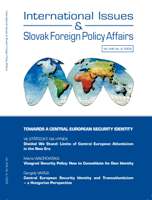Visegrad Security Policy: How to Consolidate its Own Identity
Visegrad Security Policy: How to Consolidate its Own Identity
Author(s): Maria WagrowskaSubject(s): Politics / Political Sciences
Published by: Research Center of the Slovak Foreign Policy Association (RC SFPA)
Keywords: Visegrad Four; Poland; security; transatlanticism
Summary/Abstract: From the Polish perspective, the link between the security of Central Europe, including the Visegrad Group, and transatlanticism comprises probably more threads than for the remaining countries of this region. According to the author, the first such factor is the country’s specific geographic location. Another factor distinguishing Poland from amongst the remaining states is eastern policy. The third factor determining Poland’s identity in foreign and security policy is its belonging to the democratic West, perceived as a community of values and objectives as well as Euro-Atlantic structures. The author therefore states that in the field of security Poland’s identity is being shaped by past and present occurrences and phenomena taking place along the East-West divide. As for the Visegrad Group, the author argues that precisely now three chances have emerged enabling Visegrad to consolidate its own identity and assert its presence within the transatlantic community: a common position on allied security and defense issues, a contribution to European security and defense policies and, last but not least, an attempt to find a common denominator in issues of conventional arms control.
Journal: International Issues & Slovak Foreign Policy Affairs
- Issue Year: XVIII/2009
- Issue No: 04
- Page Range: 31-43
- Page Count: 13
- Language: English

